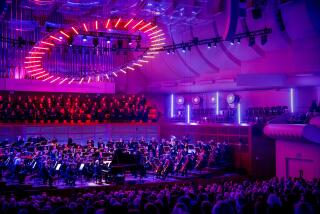Critical Standards Need Explanation
- Share via
Chris Pasles’ dismissive review of “Hidden Legacies” by Roger Bourland and John Hall (colleagues of mine at UCLA) instantiates what for me has been a failure of music-culture criticism, a failure marked by an all-too-frequent paucity of anything resembling an enlightening account of what went on, what was or could be heard in some work of music, in some composer’s mind’s ear.
Rather, the critic ensconces him(usually)self in a report mode that gives background, gossip, sometimes context. In this case, two-thirds of Pasles’ review (“AIDS Cantata Premieres at UCLA,” Calendar, March 31) was a sympathetic commentary about the Gay Men’s Chorus of Los Angeles, its performance “commitment” and the personal “legacies” of many of its members. Much of this sort of background is not irrelevant.
However, when nothing about the work’s actual sound is made available to any interested reader, then the critic has been irresponsible. If Pasles had actually told us what was so objectionable, so “banal,” I’d be more interested in his opinion.
That Pasles found no redeeming “artistic” values in the work is his business. But that he made no effort to report on the richness of its choral orchestration is reprehensible.
For example, the Bourland-Hall work included not only multipart full ensemble choruses and instruments (four synthesizers, double bass and percussion in the Royce Hall pit), but also a full, resonant a cappella psalm (or hymn), a cabaretlike song, country-Western chorus and onstage dance, and juxtaposed unisonal and chordal sonorities--each “number” and its order impeccably well-paced.
Most likely, a modeling based on “pop music” was a necessary condition in order for this work to reach the largest audience possible, and perhaps in order for it to be performed and received as well as it was. “Hidden Legacies” is unabashedly “pop” and discreetly sentimental.
In reading Pasles’ review, I felt that he did not consider “Hidden Legacies” to be a manifestation of so-called “serious music” (about which I know much). That’s not the problem.
But his comment that “pop music models could be heard throughout, if at more banal levels,” suggested to me that perhaps he dismissed the work early on because it derives from the pop world.
Perhaps Pasles can enlighten us someday and write a critical text concerning his evaluative criteria for determining what sorts of music do or do not have “artistic values.”
Professional composers deserve more from critics than just to be told that their work is not “important.”
More to Read
The biggest entertainment stories
Get our big stories about Hollywood, film, television, music, arts, culture and more right in your inbox as soon as they publish.
You may occasionally receive promotional content from the Los Angeles Times.










